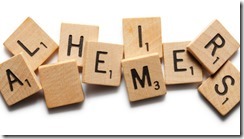 I know many people who worry about getting Alzheimer’s because a grandparent, parent or sibling suffers from it. When keys are lost, eyeglasses are misplaced, or things historically recalled are forgotten, family members of those with Alzheimer’s or other dementias often wonder if they, too, have the disease.
I know many people who worry about getting Alzheimer’s because a grandparent, parent or sibling suffers from it. When keys are lost, eyeglasses are misplaced, or things historically recalled are forgotten, family members of those with Alzheimer’s or other dementias often wonder if they, too, have the disease.
But according to the Alzheimer’s Association, the greatest risk factor for Alzheimer’s disease is not genetics, it’s age.
Alzheimer’s disease presents itself primarily in those age 65 or older. Statistics show the likelihood of developing Alzheimer’s doubles about every five years after age 65. After age 85, the risk reaches nearly 50 percent.
Because so many people are living longer, we’re seeing a signifi cant increase in the numbers with the disease. It’s predicted that by 2050, as many as 16 million Americans will be living with Alzheimer’s.
One tool—memory screenings performed by qualified medical professionals—may help in determining if there’s been a decline in memory or thinking skills.
According to the Alzheimer’s Foundation, a memory screening is suggested for anyone concerned about memory loss or experiencing warning signs of dementia; anyone whose family and friends have noticed changes in them; anyone who believes they are at greater risk due to a family history of dementia; or anyone who wants a baseline for future comparisons.
“A simple memory screen provides a safe, cost-efficient intervention that can reassure the healthy individual, promote successful aging and and, when indicated, direct individuals to appropriate clinical resources,” according to Rosemary Gordon, director of day programs at Senior Concerns.
Memory screenings can provide a benchmark for discussion with your physician.
Each year, the Alzheimer’s Foundation sponsors community memory screenings and awareness-raising education.
This year, Senior Concerns will host free community memory screenings from 9 a.m. to 1 p.m. Sat., Nov. 15 as part of the Alzheimer’s Foundation of America’s National Memory Screening Day.
This year’s Memory Screening Day at Senior Concerns will also feature guest speakers Sherry Lynn Harris and Viki Kind.
Sherry Lynn Harris spent 18 years caring for her mother with Alzheimer’s. As part of her healing process, she authored the book “Adapting to Alzheimer’s.” Harris’s presentation will include many stories from her journey, and she will share immediately useful ways to adapt to situations of memory loss.
Viki Kind, a clinical bioethicist, medical educator and hospice volunteer, titled her presentation “What I Wish My Dad and I Had Known Before He Was Diagnosed with Memory Loss.”
According to Kind, “Being diagnosed with memory loss can feel overwhelming. What makes it even more difficult is how much there is to learn to be able to cope with the new diagnosis.”
Kind will share what to do when you suspect memory loss, available resources, and building a supportive caregiving team.
Kind has authored an awardwinning book, “The Caregiver’s Path to Compassionate Decision Making: Making Choices for Those Who Can’t,” which guides families and professionals through the difficult process of making decisions for those who have lost capacity.
Both Harris and Kind will have copies of their books for sale.
National Memory Screening Day and the Alzheimer’s Foundation of America’s year-round Community Memory Screenings program are part of the AFA’s national initiative to promote early detection and intervention for those concerned about memory loss and to educate the public about successful aging.
Senior Concerns is at 401 Hodencamp Road in Thousand Oaks. Reservations for the free memory screenings on Nov. 15 are required by calling (805) 497-0189.




